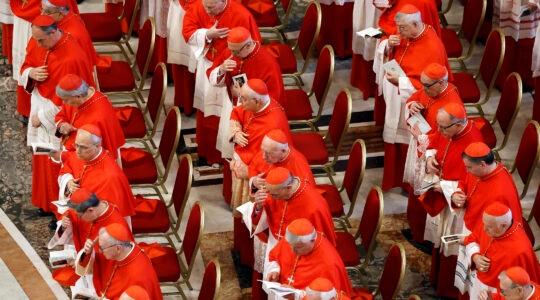Few Jews probably shed tears this week when longtime Venezuelan President Hugo Chavez succumbed to cancer.
The populist president who came to power in 1999, seven years after a failed coup attempt, transformed not just his country, but Venezuela’s relationship with the Jews. In a country that had virtually no history of anti-Semitism, Chavez allowed state media to carry anti-Semitic messages and tropes, broke diplomatic ties with Israel, and sent the police into Jewish schools and community institutions.
The first major sign of trouble came several years into Chavez’s reign, in late 2004, when a Jewish school in Caracas was raided by police ostensibly searching for evidence connected with a high-profile murder case of prosecutor. No evidence was found.
As Chavez promoted his socialist vision, nationalizing private industries, instituting foreign exchange controls and building a close alliance with Cuban President Fidel Castro, an exodus of upper- and middle-class Venezuelans — Jews among them — took hold. In 2005, JTA went to Weston, Fla., to report on the Venezuelan Jewish expat community in South Florida.
One of the anti-imperialist president’s frequent targets of criticism was the United States, whose president he mocked and whose ally, Israel, he cast as an imperialist aggressor. Chavez cultivated close ties with Tehran, seeing in Iran’s conservative theocracy an ally in his leftist struggle against Western hegemony. He frequently invoked the Palestinian cause, likening Israel’s treatment of Arabs to that of the Nazis. When Israel and Hezbollah went to war in June 2006, Chavez accused Israel of Nazi war crimes and recalled Venezuela’s ambassador in Tel Aviv.
The formal diplomatic break with Israel came in 2009, when Israel fought a war with Hamas in Gaza. During the fighting, Chavez demanded that Venezuelan Jews rebuke Israel for its actions. Jews feared that Chavez’s linking of local Jews to "Israeli war crimes" sent the dangerous signal that anti-Semitism would be tolerated in Venezuela.
When a synagogue was attacked in the days following the Israel-Hamas war — vandalized by armed perpetrators who threw Torah scrolls on the floor and scrawled “We don’t want Jews here” on the walls — international Jewish groups blamed Chavez for poisoning the atmosphere. "It is increasingly unsafe to be a Jew in Venezuela," B’nai B’rith International President Dan Mariaschin wrote in a JTA Op-Ed. Weeks later, Venezuelan police were implicated in the attack.
The attack followed several years in which anti-Semitism had ceased to be a rarity in Venezuela.
"We’ve never had anti-Semitism here in Caracas, so this situation is something new," Caracas community member Moises Nessim told JTA’s Hal Weitzman in 2007. "I would say there is worry and concern, but not yet fear — more uncertainty about what’s going to happen."
More trouble was to come. In February 2009, a bomb was tossed into the Beit Shmuel synagogue in Caracas. Meanwhile, Chavez continued to cultivate ties with Iran, Syria and Libya, and lambasted Israel as a "genocidal state."
The Chavez regime denied that it was anti-Semitic. In a JTA Op-Ed in 2009, the charge d’affaires at Venezuela’s embassy in Washington, Angelo Rivero Santos, called Venezuela’s Jewish community "an integral and essential part of our country’s singularly diverse society." Venezuela’s foreign minister visited the synagogue that had been attacked. In September 2010, Chavez met with Venezuelan Jews to reassure them over concerns about anti-Semitism in state-run media. "Revolutionaries cannot be anti-Semites,” Chavez said that month during a rally for the United Socialist Party of Venezuela. By the end of 2010, Venezuelan Jews reported a positive shift in tone by Chavez.
But it didn’t last long. As opposition leader Henrique Capriles Radonski, a grandson of Holocaust survivors, emerged as a political rival, the president’s broadsides against Capriles took on anti-Semitic overtones. It also turned out that Venezuela’s secret service was spying on the country’s Jews.
After Chavez’s death, it wasn’t clear what would happen in Venezuela. As the nation mourned, Jews held their breath and laid low.
JTA has documented Jewish history in real-time for over a century. Keep our journalism strong by joining us in supporting independent, award-winning reporting.





